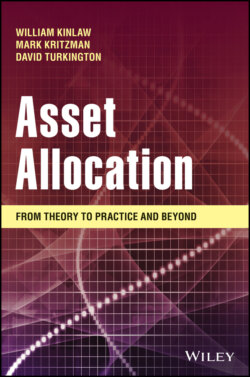Читать книгу Asset Allocation - William Kinlaw, Mark P. Kritzman - Страница 42
SELECTION SKILL
ОглавлениеAn asset class should not require an asset allocator to be skillful in identifying superior investment managers in order to raise a portfolio's expected utility. An asset class should raise expected utility even if the asset allocator randomly selects investment managers within the asset class or accesses the asset class passively. Not all investors have selection skill, but this limitation should not disqualify them from engaging in asset allocation.
Think about private equity funds, which are actively managed. Early research concluded that only top-quartile private equity funds earned a premium over public equity funds.1 If this were to be the case going forward, private equity would not qualify as an asset class, because it is doubtful that the average asset allocator could reliably identify top-quartile funds prospectively, much less gain access to them. More recent research, however, shows that private equity funds, on average from 1997 through 2014, outperformed public equity funds by more than 5% annually net of fees.2 If we expect this level of performance to persist, private equity would qualify as an asset class, because an asset allocator who is unskilled at manager selection could randomly select a group of private equity funds and expect to increase a portfolio's utility.
